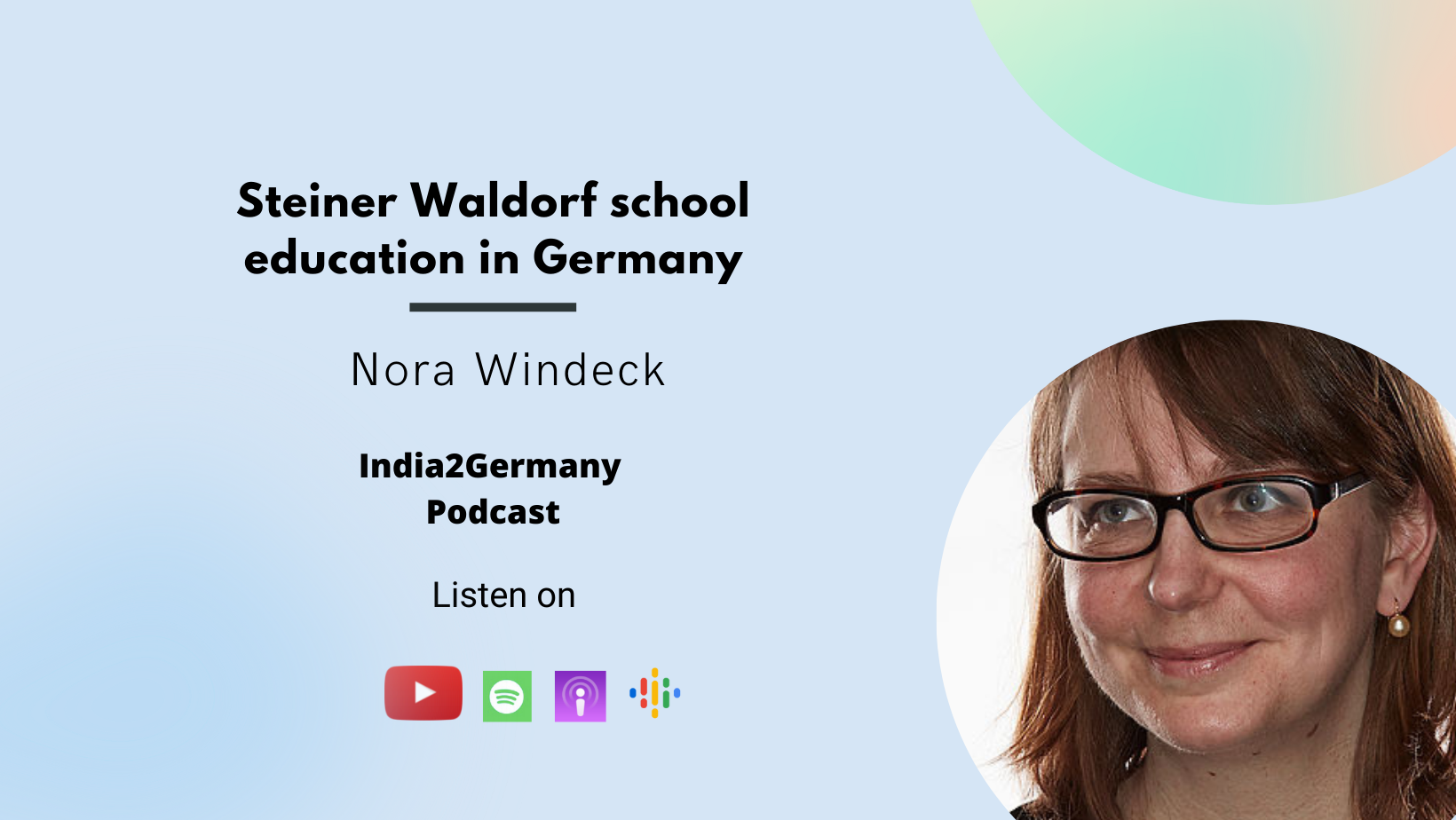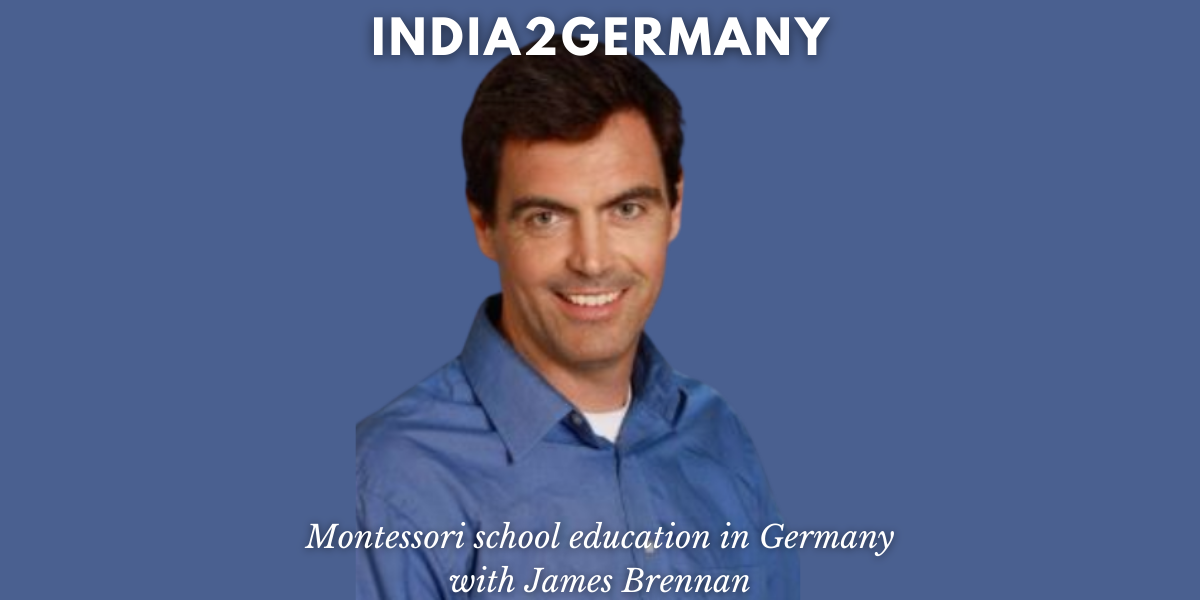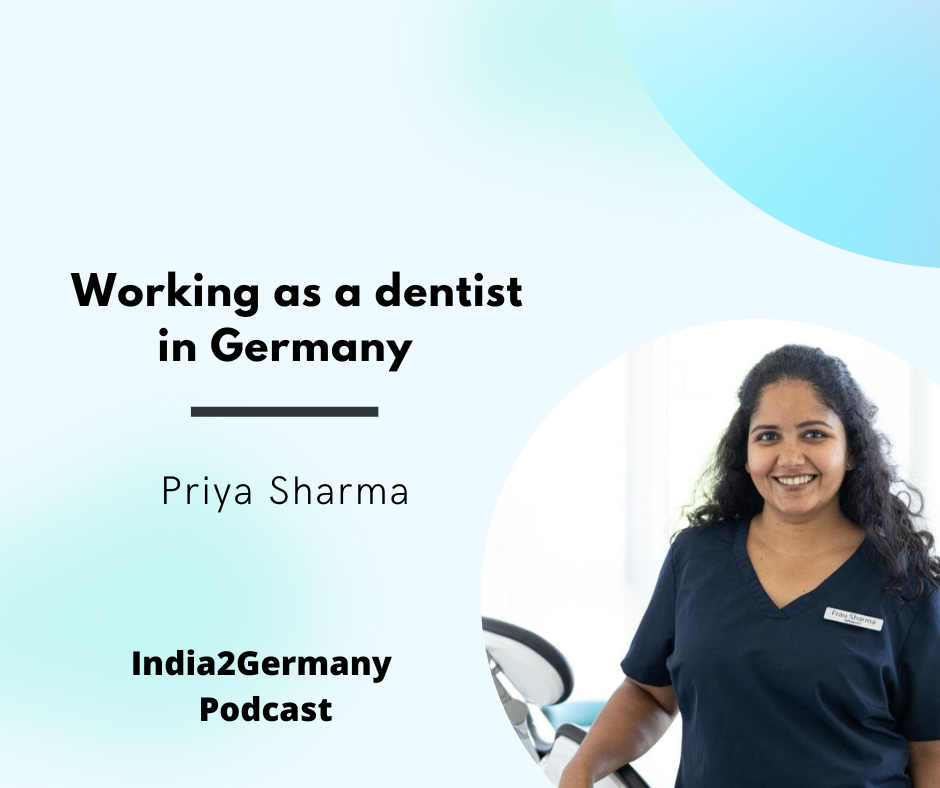
Steiner Waldorf school education in Germany with Nora Windeck
Nora has been closely associated with Waldorf education for many years. Listen to her insights on what makes Waldorf education special, how it differs from education in state schools, what its main principles are and her suggestions for parents looking for the right education for their children.
Starting with its first school in Stuttgart in 1919, Waldorf education has spread all over the globe with already more than 1000 schools worldwide. In Germany, Waldorf schools are highly sought after, with long waiting lists common in several places. Today on India2Germany, we speak with Nora Windeck, co-founder of Steiner School in Dublin, about Waldorf school education in Germany. Originally from Berlin, Nora is an award-winning film-maker who has worked for Berlinale and Edinburgh film festivals, and has won numerous accolades for her short films, art installations and music videos.
🎙 You can also listen to this conversation on Spotify, Apple Podcasts, Google Podcasts, YouTube or your favorite podcast platform 🙂
📬 Get the latest India2Germany articles via email 📨
Show notes
Nora, you are co-founder and chairperson of the Board of Directors of the Dublin Steiner School. Could you tell us about yourself and your association with Waldorf education?
- I was lucky enough to go to a Steiner kindergarten, primary and secondary school myself. This was in Berlin and Southern Germany.
- 80s/90s, Steiner schools well established in Germany, really big schools of 800-1000 kids.
- Started kindergarten with 4, primary with 6, Abitur (german qualification which you need if you want to go to university) when I was 19
- Went on to university (as most of my school class did)
- I studied literature and history,
If you would like more information about school education in Germany, check out our previous article on Montessori school education.

I can imagine that founding a school is a massive undertaking and responsibility. Why did you decide to set up the Dublin Steiner School?
Because there were none in Dublin. 95% of primary schools are run by the catholic church and the very few state schools are very much overprescribed (put name down the day your child is born and then you're on a long waiting list)
My daughter went to the already established Steiner kindergarten here and there was a strong group of parents determined to set up the primary school, so we did it.
- 1styear: 7 children
- 2ndyear: 2 children
- 3rdyear: 8
- 4thyear: 16
- next year: 25
You have been associated with Waldorf education for a long time now. Could you please describe what exactly Waldorf Schools are and what pedagogical approach they follow?
- Steiner schools form the largest group of independent, non-denominational schools in the world. Many are state funded. The first school was opened in Germany in 1919 for the children of the workers of the Waldorf Astoria cigar factory, first director Emil Molt.
- There are currently over 1,000 Steiner schools worldwide and 35 in the UK.
- There are over 2,000 Early Years settings in a total of 64 different countries.
- The priority of the Steiner ethos is to provide an unhurried and creative learning environment where children can find the joy in learning and experience the richness of childhood rather than early specialisation or academic hot-housing.
- Not too soon, not too late. The lesson content and its method of presentation are linked to the children’s emotional, social, physical and intellectual development. Formal education, which begins at age six, is introduced in a way and at a pace that respects the child’s developmental journey.
- The curriculum itself is a flexible set of pedagogical guidelines, founded on Steiner’s principles that take account of the whole child. It gives equal attention to the physical, emotional, intellectual, cultural and spiritual needs of each pupil and is designed to work in harmony with the different phases of the child’s development.
- A high value is placed on play in the early years, imagination in the middle school and creative and intellectual thinking at secondary level.
- So, the content and methodology of Waldorf Education is based on Rudolf Steiner's insights into the development of children and youth. What does this mean for practical implementation?
- Educate the head the heart and the hands. All three need education, not just the head.
- First few years of childhood everything is an experience, is not understood intellectually.
- Formal education, which begins at age six, is introduced in a way and at a pace that respects the child’s developmental journey.
- The use of drawing, painting, music, movement, poetry, modeling and drama enhances the learning experience in all subjects.
- The development of every pupil is closely monitored, mainly through ongoing formative assessment and in-depth study.
What exactly does the teaching in a Waldorf school look like and how do Waldorf schools differ from other schools?
- Takes account of the needs of the whole child – academic, physical, emotional and spiritual.
- Sees artistic activity and the development of the imagination as integral to learning.
- Relationship with teacher is incredibly important. Not just teacher but role model, mentor and educator.
- The core subjects of the curriculum are taught in thematic blocks and all lessons include a balance of artistic, practical and intellectual content.
- The same teacher teachers a wide variety of subjects, from reading & writing to biology, geography, etc. These are taught in what is called epochs, “Epochenunterricht” they are blocks, called main lessons.
- Other lessons like languages, music & crafts often taught by a different teacher.
- Biggest difference: There are no grades and that even students with slower learning progress don’t have to repeat school years -> School fits around the child, child doesn't have to fit inside the school.
Music and art play an important role in Waldorf Schools. Why is that so? Should parents therefore send their children to a Waldorf School if the child is particularly artistically gifted or if the parents attach particular importance to art and music? Handicraft activities are also taught at Waldorf Schools. Boys and girls learn to knit and sew. In handicraft lessons they learn to carve and learn carpentry, where they build chairs and other small furniture. Why do they value these craft skills?
- Steiner saw, even in his time, a development of society towards intellectual or technical jobs, away from traditionally crafts and arts. But to his mind arts & crafts hugely important, because they balance out the development of the children (of every person really) as a whole.
- Early on it's the fine motor skills of fingers, spacial thinking, problem solving, construction and perception.
- Many crafts train the brain function.
- So, yes, if you think your child is particularly artistically gifted a Steiner school would be a great place for them. But this does not mean that if your child has no particular gift you shouldn't. Every child has abilities that are fostered but the child should never feel stressed.
- Early on it's the fine motor skills of fingers, spacial thinking, problem solving, construction and perception.
You mentioned the concept of Epochenunterricht. What is meant by it?
One subject is taught intensively over a period of time, usually 3 weeks, where every morning this subject is taught for two hours, ancient Greece, mathss. Gets the children really into the world of this subject, they immerse themselves, create a book or folder with hand drawn images and written texts about this one subject matter.,
As you have already mentioned, a characteristic of Waldorf Schools is that there are no grades and that even students with slower learning progress don’t have to repeat school years. Why are there no grades and no classes repeated? Are the students motivated to learn at all? How can students’ progress be assessed this way?
- From very early on there's huge emphasis on teaching the children to love to learn. The motivation should come from the child. You can rely on your own experience, of course you know what subject you're good at and you see in class environment who of your friends is good at what. Creates tolerance and understanding towards individual abilities and strengths.
- We think that the unique qualities of each child can be observed and described, but not always measured. Child is not defined by result of her/his test results but as a whole complex being.
- Strong emphasis on repetition and learning by heart (poetry – teaches the holding on of information)
- Of course the teachers can still assess the progress by looking at the work the child produces and there are test-like situations where the taught material is repeated.
Are children at a Waldorf School taught following a specific cultural or religious ideology or is the school open to all cultures and religions?
- Yes, school open to all religions, everybody is welcome. While Steiner's teaching is founded in Christian religion and cultural beliefs all religions are respected and explained, often in mythological terms or so that the children can learn something.
- Example: The Bible story of Saint Martin, a rich man who cut his coat in half and gave it to the beggar is told as an example of charity and goodwill towards others.
Music, art, no grades. As a parent, I might be concerned that my children might suffer later in the tough professional world. What are your views on this? Are students in Waldorf Schools sufficiently prepared for our technologically advanced world and can they even find their way in a competitive professional field?
- Personal experience: amongst the people in my class there's a judge, lawyers, doctors, maths teachers, a fashion designer, an actor, publisher...
- Yes, art and music play a big part but everything else is also taught, so maths and physics are also well taught, so if you have an aptitude for these subjects you are equally well supported and challenged.
- I recently met a guy here in Dublin who went to a Steiner school and now teaches Mathematics here at Trinity college.
- There are also studies that show that because of the way children in Steiner school are taught HOW to think and not just WHAT to think they have the ability to successfully approach almost every subject matter because they think creatively.
What kind of a school certificate (Abschluss) does one obtain at a Waldorf School in Germany?
- You can do all three options that are available in Germany, a Gesamtschulabschluss, Mittlere Reife and Abitur. You need an Abitur (like A Levels in England or Leaving certificate in Ireland) in order to go to university.
- Majority of my class passed their Abitur and went to some form of 3rdlevel education. Grades are about the same, sometimes even better.
Nora, you found your passion in films and built a very successful career in the field. How has Waldorf education benefited you personally and/or professionally? Would you recommend it to others?
- Again I think being brought up to think creatively has helped me a lot in problem solving and dealing with people. The idea what teachers are there to support you and bring out the best in you I think is amazing too.
- Of course we are never just our schooling -- parenting and peer groups also play a huge part but I can honestly say that I was never afraid to go into school, I loved going to school. And I think that's huge! And that's want I want or my children too.
📬 Subscribe to our newsletter to stay up-to-date! 👇
India2Germany Newsletter
Join the newsletter to receive the latest updates in your inbox.







